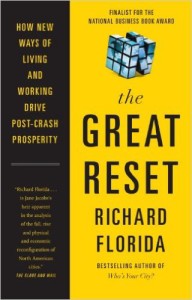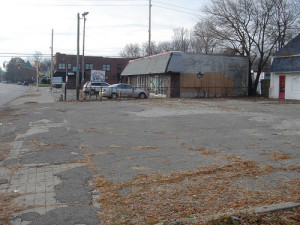Richard Florida takes a lot of heat in certain quarters. As one of the most widely known economics writers, that makes some sense. Pretty much anyone who achieves a certain level of popularity acquires haters along the way. But most of the criticisms of Florida seem wide of the mark to me. Consider the one that he's in it for the fame and rock star lifestyle. Well, let's assume so. What's your point? Who doesn't want to be famous, or at least at some level well known in their field? I'll admit I'd like to be much more widely recognized that … [Read more...]
What Made Chicago’s Burnham Plan Successful
As part of my Burnham Plan centennial celebration, I was recently prompted to ponder what made this plan successful. (Let us put aside for future postings the question of whether it was in reality a success). I started creating a list of attributes of the plan I think contributed to its success. Interestingly, all of these are lessons for today's planners and are often overlooked. So let's consider some of them. 1. It was a private sector, business led initiative. I hear people today moan about the feckless political leadership in their … [Read more...]
The New Look of the American Suburb
This article is about the intersection of two trends I've written about before: suburban redevelopment and immigration. If you want an easy demonstration of the unsustainability of the classic American suburb, just take a drive around the inner ring suburbs of almost any city, starting with the ones that have a classic branching, winding streets, not traditional grids or those that grew up along transit lines. It is easy to find untold miles of decay, of "dead malls", "grayboxes", and subdivisions that have seen better days. If most of … [Read more...]
True Cities and Shadow Cities
As many cities, particularly smaller industrial ones, continue to struggle with the loss of manufacturing jobs, people wonder how or if these places will come back and again become economically prosperous. I think the potential for economic renewal at least partly depends on whether or not a place is a true city or a shadow city. What do I mean by that? Here is one way I categorize the economic life of cities. One can divide companies into three types: Local goods and services. These are things like banks, grocery stores, dry cleaners, … [Read more...]
The Other Side of Detroit
That picture is of a house in the city of Detroit. Surprised? Don't be. Detroit actually contains numerous intact neighborhoods ranging from working class to upscale. These are seldom shown in the voluminous photo tours of the city that tend to focus exclusively on decay, and too often on the same handful of sites such as Michigan Central Station, a practice Vice Magazine dubbed "ruin porn." The decay is there. The collapse is real. That is the story. But it's not the whole story. Amid the truly legitimate and titanic struggles of Detroit … [Read more...]
The Outsiders
What does it take in a city to bring about change? I believe that one key prerequisite for change is a critical mass of outsiders; that is, a large enough of group of people who moved there without a background or personal connection to a place. Why? Outsiders are willing to imagine things being different in the first place since they already experienced and indeed grew up in an environment that is different. It's sort of like visiting a foreign country for the first time. We notice how all sorts of little things are different, prompting … [Read more...]
Downsides of Consolidation #2 – Cost Increases, Dilution of Urban Interests, Deferred Problems
This is the second and last installment in my mini-series on the downsides of city-county consolidation, or "big box" vs. "small box" government. Part one covers neighborhood redevelopment challenges. For those of you who didn't read that, I'm not opposed to city-county consolidations at all, and generally think they've been positives in places that have pursued them. I am merely examining some of the trade-offs that come with that choice. Like any form of government, this one too has its challenges. Cost Increases Proponents of government … [Read more...]
Small Cities Should Have Fareless Transit
Following on from my transit award, I thought I'd turn from Chicago to smaller cities and look at ways they can design better transit systems. I think one of the best ways to do this is to simply build fareless systems. Why have a fare in the first place? It is odd that we pay per use on transit. We don't pay to check books out of a library. We don't pay to visit most city parks. We don't pay when the police or fire department come to our house for a legitimate emergency. Most non-utility municipal services are provided for free to users and … [Read more...]
Downsides of Consolidation #1: Neighborhood Redevelopment
This is the first in a short series of posts on the downsides of city-county consolidation. Actually, it might better be described as a discussion of some of the pros and cons of "big box" vs. "small box" municipal government. It is similar to business. It seems like every large business is either doing one of two things: centralizing or decentralizing. There's a sort of cycle of reincarnation about this. Every model has its flaws, and people tend to gravitate towards the other side of the spectrum from time to time when the problems of the … [Read more...]
An Examination of City-County Consolidation
[ This piece will serve as a warm-up to a forthcoming series on the downsides of the consolidation of US city and county governments. I updated it from the original with a bit of information about the current mayoral election in Louisville. ] H. V. Savitch and Ronald K. Vogel of the University of Louisville authored the paper "Suburbs Without a City", analyzing the merger of Louisville and Jefferson County, and in the process making many good observations about or relevant to other consolidated cities like Indianapolis and … [Read more...]
- « Previous Page
- 1
- …
- 25
- 26
- 27
- 28
- 29
- …
- 32
- Next Page »


